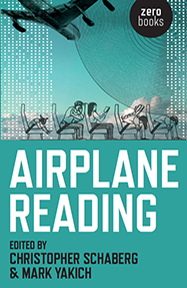In any airport that makes it possible, I like to see the plane on which I will soar. Most terminals I have been in afford fantastic views of the tarmac and the impending plane I will depart on, and I use the time between Earth and Heaven (the 60 or so minutes that expire before my tremulous body is catapulted into the sky in a long arc) to complete my own “circle check” of the plane. Having watched all episodes of Mayday, I’m convinced that I can discern potential catastrophe in visible flaws, either in the physical integrity of the plane or the emotional composure of the crew. One time, as I pressed my nose against the plate glass to examine an obvious and undulating crack along the tail of an Airbus A300, I watched a flight attendant walk around the plane doing a visual inspection. I was impressed that she felt powerful enough to impose herself as unorthodox cog in the wheel of redundancy and sure that she would report the same crack that I had seen. Her blonde ponytail was girlish and sexy and it bounced as she walked around the phallic fuselage.
Gentlemen might prefer blondes but skittish passengers onboard a flight out of Albuquerque do not. Crossing the threshold of the front door, I looked into the cockpit and saw the same safety-conscious flight attendant sitting in one of the two seats. Beside her was another woman, also blonde and tailed. Both of them wore caps that sat high on their lusty manes and they looked like they might be readying for a photo shoot for Playboy rather than completing a pre-flight check list.
Men have larger hearts, denser bones, better spatial skills, and are 50% stronger than women in the upper body. They have 176,000 kilometers of myelinated axions on which nerve impulses travel, while women have 30,000 less. Women crash planes more frequently during take-off and landing. Women suffer from chronic anxiety and depression more than men. Their wounds heal slower. Nerve impulses travel in the human body faster than a jet at the point of committed take-off.
As the old joke goes, “If women were meant to fly, then it would be a ‘box office’, not a ‘cockpit’.” Every Top Gun cliché skewed my calculation of the likelihood of us dying on this flight. Crew Resource Management and Standard Operating Procedures could not impose logic on a cockpit “manned” by emotional women; they’d likely apologize to one another as the plane spiraled into the desert sand from 30,000 feet. Deference and crying instead of determination and brute force would be transcribed by the FAA onto the record that concluded we all died due to a feminine mystique.
Could a female pilot ask the girl beside her what the difference is between a duck and a copilot and then provide the answer as “a duck can fly”? A man can do that, and did it, on a flight that crashed. Would they talk about cheating husbands or shoes, or would they discuss insurance policies, as the men did, who flew a 727 into a Cessna, killing everyone on board both aircraft? Do women always revert to their emotional mean while men trend to masculine impulsivity?
I’ve watched Youtube videos taken inside Boeing cockpits (pre 9/11 presumably?) showing the crew landing the plane. Without autopilot the captain, or less often in a diplomatic gesture, the first officer, flies the plane onto the Earth. You can see a man’s forearm muscles flex and burn as he pulls and pushes on the yoke. Now the real flying is happening; this is not a matter of punching codes into the computer or reading instruments. The visceral connection between man and machine spawns a hundred other connections with passengers and crew and all futures converge on the present controlled by the man in the front of the plane. This one man subdues the beast and another day is preserved for all aboard.
On that day in Albuquerque as the two women taxied us onto the runway, I considered the incredible shrinking interstice between life and death, love and lust, men and women. They were attractive, these men-dressed-as-girls-dressed-as-pilots (or any permutation of this arrangement) and in another place I might have seen their sexuality; my gaze would linger on their tanned arms and curved clavicles, which their stiff white shirts accentuated. In this place and this time I thought instead of their thin hairless arms gripping the plane as it thundered down the parabolic arc and heard them begging the machine to just listen, please just hear my words.
At cruising altitude the pilot announced the weather and described the clouds as lovely (a faint giggle, maybe, or a slight tremor in her voice?). Did she take off her cap and remove the band from her hair and sweep it across her collar? Did she defer to some masculine cliché at home or did she date only sensitive men? I’d never thought so much about the pilot and so little about the plane or destination. I ignored the chimes and smells (always of smoke, I assure you) and decided that any human who could create and nourish another human might overcome every gender-based shortcoming I included in the calculus of competence.
The Pope embarks from his plane and kneels to kiss the ground. I see this gesture as thanks to God for keeping the plane aloft. When we landed in Denver I saw the women in the cockpit and wanted to, papal-like, kiss each of them on their hands and thank them for a fine flight. The exiting passengers flowed ahead and behind me and the burly male flight attendant kept us moving out of the plane. “Please thank the pilots for me,” I asked him. “Sir, they have children who thank them every day.” Lucky kids.
Kevin Bray is a Toronto writer and teacher. His essays are often found in The Globe and Mail.






